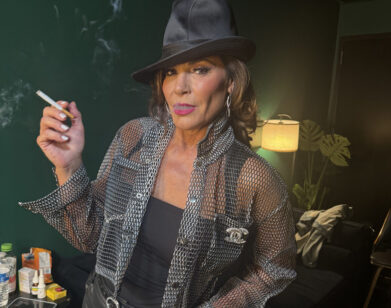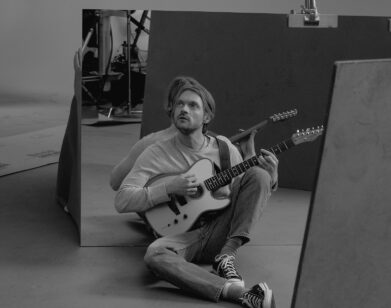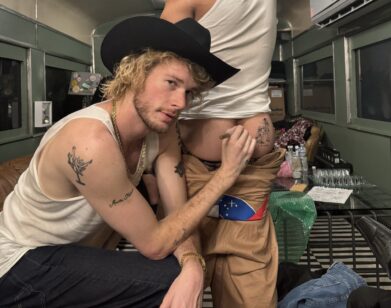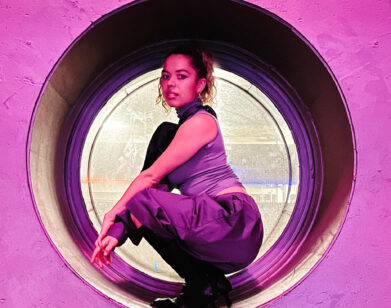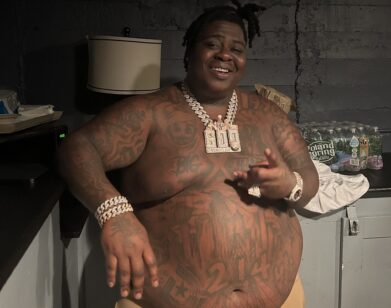The New ’90s Rapper
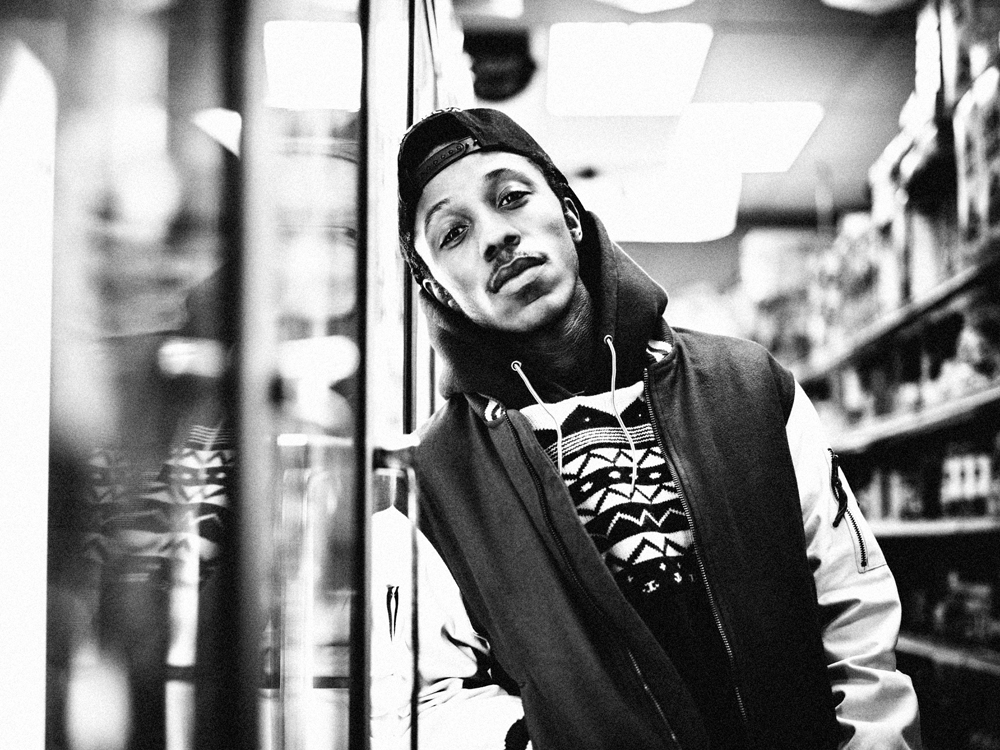
ABOVE: DILLON COOPER IN CROWN HEIGHTS. PHOTO BY CHRISTOPHER GABELLO.
“Hip-hop is sharing thoughts in a straightforward way, and people have collective thoughts,” says 21-year-old rapper Dillon Cooper. “People vibe off of it. It brings unity. It brings a bond between people.”
The are several things you should know about the Brooklyn-raised Cooper: he’s hungry, he knows his music (he studied guitar at Berklee College of Music for a year), he counts Eminem among his top five rappers (“Eminem holds weight”), his favorite fictional character is “either Otto Rocket from Rocket Power or Harry Potter,” and he’s attracting the right sort of attention (from Parisian boutique label Maison Kitsuné, the Wu-Tang Clan, Nas). Cooper released his first mixtape, Cozmik, in June and is already working on another EP. As his profile rises, we met up with Cooper to get to know him a little better.
EMMA BROWN: How would you describe your style of music?
DILLON COOPER: Easy to listen to. That’s what I try to accomplish with everything I’m doing. I’ve only put out one solid project now, so that was my first go at it. I want to make it so the listener can listen straight through without pressing skip. The goal for me is to have one track just flow into the next one and you can just get lost in it. I try to find that fluidity.
BROWN: Tell me about your family. Do you have younger siblings?
COOPER: I have a little brother and sister; they’re six and seven—super little. I have an older brother—that’s my half brother—and he’s three years older than me. Then I have a stepbrother who’s my brother, you know? He’s about nine years older than me and he has a son, so I’m an uncle, too. They’re over in London. I have a lot of family over there.
BROWN: Do your younger siblings look up to you?
COOPER: Yeah. I need to be around—I try to be around as much as possible. Every single time I’ll be away for two days or three days, I come back and it seems like they grew two feet. [laughs] They’re little superstars in themselves. My little brother, I already know he’s going to be doing something. He’s the funniest kid in the world, and he’s super cute. Both of them draw and are super talented with art, but my little sister, since she’s been younger she basically has perfect pitch. So she can hear sounds and and just play it back on the piano or sing it back in the same way. I’m just like [snaps], I wish I had that.
BROWN: Cozmik is your first mixtape; do you ever feel self-conscious performing some of the earlier songs that you wrote? Does it feel like you’ve moved on it terms of skill and sentiment?
COOPER: It’s a journey. That mixtape will always mean a lot to me just because it was my first mixtape. I enjoy the stuff that I write—I write down my thoughts and my thoughts make me remember stuff, or what I was going through at that point in time. It’s always good to go back and listen to it. I don’t like listening to myself a whole bunch. I have to force myself to. I can’t say that it doesn’t represent me, because that was my first stamp.
BROWN: For most people, becoming a rapper—or an entertainer of any kind—is a pipe dream. Did you think you would come this far?
COOPER: Yeah, I did. I’ve always told myself that I’m going to be something. Growing up, if somebody told me I was going to be a rapper, I would have been like, “Really? That’s cool.” I wouldn’t have been like, “No, I’m not.” But it happened. I didn’t expect anything and don’t expect anything but to be great.
BROWN: You rap over Outkast’s “Ms. Jackson” and Mobb Deep’s “Survival of the Fittest.” Is it easier to recite personal lyrics over someone else’s beat? Does it remove you at all from the lyrics?
COOPER: It all depends on the state of mind that you’re in. If I was going to write a track about a situation that happened and I thought about it as an outsider looking in, I may go over another track so I can kind of remove myself—so it’s not coming straight from me. Everything has to be built from within, so it might not come when you want it to come. I’m waiting for that time for a lot of stuff I can talk about—it has to come out naturally, I can’t force it.
BROWN: When you have a new song idea, or you’ve written a song and you have a rough draft, who’s the first person you show it to?
COOPER: My mom. My mom or my dad.
BROWN: Are they honest?
COOPER: Oh, yeah. My dad, he’s really big into music. He was the one who got me into music when I was younger because he was always playing music. We had guitars at the house. I was always supposed to do music in my parent’s eyes. [My dad] is the person to tell me, “I’m not feeling that,” or “Ehh. Do something else.” But if it’s dope, he’ll be like, “Yo. That’s dope.” A lot of new stuff I’ve been writing, he’s been like [snaps] “That’s dope.” I’m headed in a good direction. [laughs]
BROWN: Were you good at practicing your instruments as a child?
COOPER: No. I was not. [laughs] That was the main thing I couldn’t do: I couldn’t focus, I couldn’t sit down and just practice. My mind was always wandering, doing other stuff. I think the best thing about guitar, and why I took to it more, was because I didn’t want to practice piano. [laughs] I just thought guitar was so much cooler. My dad, he had a guitar—an electric guitar—and he would not let me touch it unless he was there. He would never let me touch it. Whenever he was at work, I would always take it down, take it out of the case, start playing it. I’d put it back exactly how he had it, what he had on top—because he had stuff on top of the guitar case—and next to it. I would have it back the exact same way so he wouldn’t find out.
BROWN: Did he ever notice?
COOPER: I think he came home one day and he saw me with it, and I was just like, “Uhhh….” [laughs] and he’s like, “What are you doing?” I [said], “I really want to play.” So he got me an acoustic-electric: “If you really want to play, you’ll have to learn to play whatever you want on this first.” Then, for my 13th birthday, they ended up getting me an electric. I wasn’t being really serious about it because [before] I was like, “I can’t really get the Jimi Hendrix sound [on my acoustic-electric].” [laughs] When I got my electric, that was the best day in the world.
BROWN: I know your mother used to take you to rap concerts. Was she ever concerned about the lyrics?
COOPER: Nah. Growing up, she was like any mom, with the “Oh, no. That’s parental advisory. You can’t listen to that right now.” But then it kind of weaned off. Growing up, I was really into rock and R&B. In high school, I started getting into hip-hop. They couldn’t really say that much. [laughs] And they liked it too, so it was cool. Something they could vibe to.
BROWN: Is there much of a hip-hop scene at Berklee? That’s not the first thing I associate with it.
COOPER: Nope. Not at all. [laughs] I can count every person who’s into hip-hop and be lucky to fill up both hands. [laughs] But it’s diverse in everything else that they listen to, so it influences you a lot because you get exposed to a whole bunch of different styles and different feels for music.
BROWN: You get compared to some other young rappers like Joey Bada$$ and Chance the Rapper. Do you know Joey?
COOPER: Yeah, Joey’s cool people. We have the same agent and everything. We met and hung out.
BROWN: Hip-hop and fashion are increasingly intertwined. Do you feel like you have to be fashionable in order to be successful in hip-hop today?
COOPER: Somewhat, yeah. Just being from New York, that’s something that you do—knowing how to dress. High school, that’s how you get your points.
BROWN: What was the thing to wear at your high school?
COOPER: It depended on where you were from. If you were from Harlem, you were wearing a Big Boy merm, Asolo boots, cargo pants, Brooklyn clasp hat, True Religion and Nudie jeans, varsity jackets, Monclers. High school was fun—North Faces. All my friends, we weren’t really in with the whole borough fashions like that, we were really into street wear. We started getting into street wear heavy in freshman year. I remember 9th and 10th grade, that’s when we started our whole retro stuff, like the high-top fades.
BROWN: Do you think you have a thick skin?
COOPER: Yeah, I have to. I’ve been through a lot of stuff. My parents are strong; I have a really strong mom. She’s held it down for a long time. She’s the strongest person I know—some Afeni Shakur type stuff. That’s how I see my mom and how important she is to me. She’s always been real tough-love with me, growing up. So I’ve had to build a thick skin and not let outside influences really get to me. It does. I have a temper. I had a temper growing up. But I’ve learned, as I’m getting older, to kind of cool it down and not let negativity get to you because that’s all it’s going to do—it’s going to get to you.
BROWN: Does you mother ever ask you about your lyrics—when you use the word “bitch” or talk about getting high?
COOPER: Yeah. With the “bitch” thing, with my new stuff, I’ve been trying to stop saying that as much. I have a little sister and a little brother. They look up to every single thing that I do and even with my lyrics now, my little brother and sister can’t listen to my music. It sucks because they’ll see a video on YouTube, or I’ll play it for them and every single time it says something I’ll just press mute, mute, mute, mute. There’s a lot of stuff that I want to do just so I can be internally happy. That will just make me really happy.
CHECK BACK FOR MORE ON DILLON COOPER IN FEBRUARY. YOU CAN DOWNLOAD COZMIK HERE.
For more of our 14 Faces of 2014, click here.

